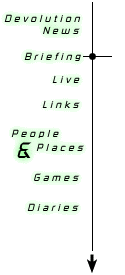
The Welsh Devolution Debate
7 September 1997
The booklet outlining the government's plans for a Welsh Assembly has been posted through many letterboxes by now: but there is still strong disagreement about what they will mean for Wales.
The Government says that an Assembly would give Wales greater clout and ensure Welsh voters get the policies they want. Sceptics may ask why present government ministers in the Welsh Office can't do that.
Welsh Office minister Peter Hain says that a 60 strong elected Assembly would form a powerful block to represent Welsh interests in a way that individual politicians cannot.
There would be 60 elected members from across Wales, who would take control of the Welsh Office and its seven billion pound budget. That would mean setting policies for the Welsh economy and public services like health and education, but the Assembly would not have law-making and tax-raising powers
Opponents argue the present system of democracy works perfectly well and that another roomful of politicians would lead to constitutional conflict.
Nigel Evans, Conservative spokesman for Wales, says "Wales is already governed democratically through our United Kingdom parliament. We have a Secretary of State for Wales and the concept that Ron Davies is not answerable to anyone is a nonsense"
The role of the Secretary of State following the establishment of a Welsh Assembly has been questioned. Ron Davies says he would continue to sit in the Cabinet in London, but he would be a minister without a department - the Welsh Office civil servants would be working for the Assembly. Critics argue that this will seriously reduce his ability to argue for Welsh interests.
The 60 members of the Assembly would be elected every four years by a new method.
40 members would be elected directly from each Welsh constituency by the present system of first past the post.
20 additional seats would be allocated according to each party's share of the vote. These 20 members would be elected from party lists.
This is an attempt to ensure that Labour's domination of South Wales would not necessarily mean that Labour would always dominate the Assembly, or that South Wales would dictate to the north.
Plaid Cymru MP Ieaun Wyn Jones points out that there will be a committee for the North West (as there will be for all regions in Wales), in which he says the area will be able to set its own priorities. This committee is just one of those that members of the Assembly may participate in. Committees will run anything from housing to roads. An executive committee will act much like a Welsh cabinet of whom the most powerful member would be the leader of the Assembly.
The question many people will want answered is what difference an Assembly would make to them. Would, for instance, those protesting against the threat to community hospitals in mid-Wales, get a better deal out of an Assembly ? Opponents argue it would be wrong to decide such matters through political horse-trading. Supporters say it would make a big difference.
The Liberal Democrat spokesman Richard Livsey says that the Welsh Assembly will never countenance the closure of community hospitals because no one in the areas that community hospitals service would want to see them closed. He feels that there will be more democracy than there was
Critics say there are still too many unanswered questions: they argue that the money to pay for the Assembly - upto £37 million in the first year - could be better spent on problems of more immediate concern to the people.


